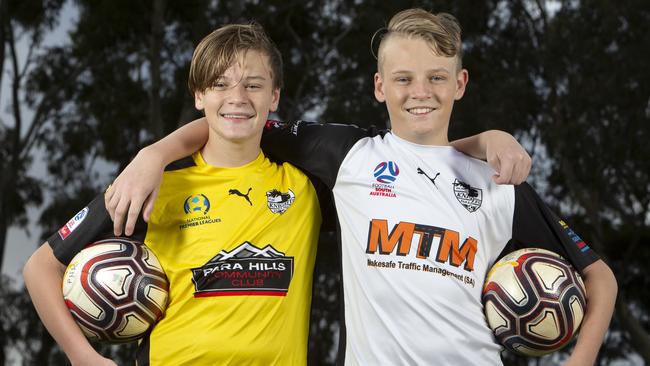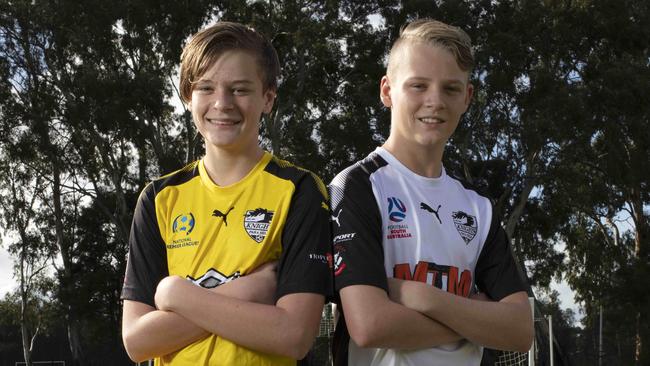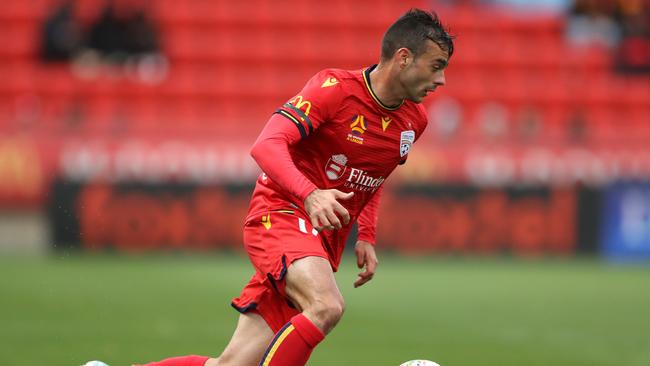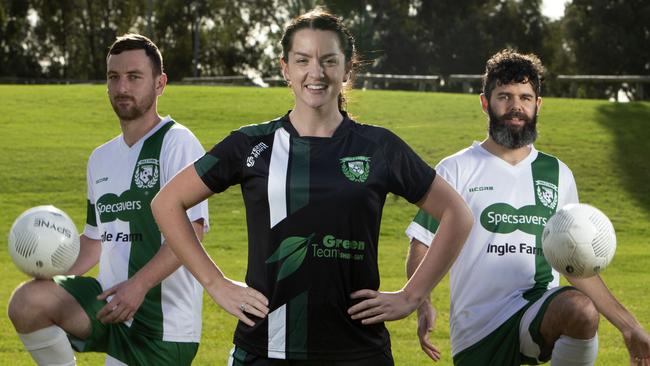Soccer players around South Australia are about see the way they train change as they return to their clubs on Monday
South Australian soccer clubs will return to training on Monday but not as they know it, with the 35,069 players set to use new methods due to strict conditions. GET ALL THE DETAILS.

Football
Don't miss out on the headlines from Football. Followed categories will be added to My News.
Soccer clubs are calling for financial help to cope with spiralling costs and a coronavirus-led revenue drain, as they prepare to lead the way in a return to sporting action.
Football SA’s 35,069 registered players will be among the first athletes in the state to resume training with their teams, under strict conditions from Monday.
Guidelines formed in line with the Australian Institute of Sport’s Framework For Rebooting Sport and talks with Sports Minister Corey Wingard have helped end soccer’s two-month shutdown.
As per State Government regulations, training will be restricted to non-contact skill drills, such as passing, shooting and heading, in groups of 10 players and coaches.
Participants will be advised to arrive at the ground in their kit, shower at home before and after sessions, and maintain 1.5m social distancing to reduce the risk of infection.
FSA also revealed to The Advertiser it was seeking government approval to restart junior and women’s competitions in June, followed by senior men’s leagues in July.
The Advertiser spoke to clubs about the latest developments as part of the paper’s Support Our Clubs series.
They welcomed getting back on the training field and predicted a surge in mental health and engagement among players, volunteers and supporters.
But they said economic assistance and a united front was required to cover rising expenses, as well as hits to sponsorship and match-day income, in some cases reaching six figures.
Para Hills chairman Dale Ramsey said the top-flight outfit and others would struggle to remain viable without a reduction in player registration, team affiliation and referee fees.
“The club gets in your blood, so being back playing again is what everyone is looking forward to,” said Ramsey.
“But the costs of running the club have just gone through the roof … while the doors are shut and there’s no revenue.”
Para Hills spent $76,000 fielding 24 senior and junior teams last campaign.
“There are clubs, us included, that if things don’t change, will close the doors (permanently). Clubs are scraping by and have been for years. Hopefully this is the reality check the game needs.”
All matches and training were suspended indefinitely on March 16, four rounds into the senior season.

FSA is awaiting Government clarification on whether multiple groups of 10 can now train at one venue, provided social distancing is adhered to.
State League One side White City backed the plan, while also raising concerns about Federation fees.
President Andrew Popovich said recent discussions between clubs aimed at reducing player payments across the state’s top three divisions were another important step.
“Most people who are locked up inside their houses will see the light at the end of the tunnel once local sport comes back,” Popovich said.
“But there could be clubs in financial strife that pretty much disappear. I think players should be compensated, but we need to cut the wages to make it a bit more realistic. People need to think about the future of the sport.”
Former National Soccer League champion West Adelaide was prepared to scrap player wages altogether if it ensured its long-term sustainability, following a $100,000 loss.
Third-tier Noarlunga United said hosting games again would not only benefit its bottom line through gate, bar and canteen takings, but ensure the welfare of its members.
“Some people don’t have families here (Australia) because they’ve just moved over here, but the club has become their family,” chairwoman Monika Cadman said.
Adelaide Olympic’s priorities were matches played in front of paying spectators, along with financial support.
“I’d like to think the federation will lobby state or federal governments for some sort of funding to help them help us,” club president Stavros Parissos said.
FSA chief executive Michael Carter, pictured, said the Office for Recreation, Sport and Racing was considering its proposal to restart competitions early next month.
It included an allowance for restricted crowds at National Premier Leagues SA fixtures and a regular season ending in November.
“Football South Australia will attempt to assist clubs financially, however, this will only be achievable if we gain funding support,” he said.
“Clubs will need support from their contracted players in terms of playing for reduced match fees.”
End to long and lonely road in sight
Memories of playing to a packed Hindmarsh Stadium have motivated long solo runs and individual workouts for Nikola Mileusnic during the A-League’s coronavirus hiatus.
Now the Adelaide United winger hopes to soon be back representing his hometown club on the national stage, as the competition moves towards an August reboot.
“It sucks not playing footy for this long,” Mileusnic said.
“It’s been hard over the past few weeks not knowing when we would be back or if we would be back this season.
“We (Reds players) went from seeing each other every day, eating together and having coffees together, to absolutely not seeing anyone.
“But to finally get some sort of direction on what’s going to happen is always good and it will keep us motivated and give us a glimmer of hope.
“I definitely do miss walking out in front of the fans and playing for Adelaide United. We’re all just dying to get back out there to hopefully finish the season off strongly.”

The A-League campaign was suspended indefinitely on March 24 because of COVID-19 concerns.
United, with six of its national league rivals, stood down players and coaching staff without pay on April 1, leaving clubs in financial limbo.
The news that Football Federation Australia had received the last instalment of its television deal has boosted hopes the remaining six regular rounds and finals will be completed.
The governing body is yet to confirm timelines but teams are believed to be planning for a return to training in July and restarting the season a month later.
It comes a week after seventh-placed Adelaide parted ways with Dutch coach Gertjan Verbeek less than halfway through his two-year contract.
United chief executive Nathan Kosmina urged the Reds’ loyal supporter base to remain connected to the club via its online campaigns and be ready for a return to action.
“Don’t forget about us,” he said.
“We’ll be back soon enough … the passion (fans are) missing at the moment will be two-fold when they get the opportunity to come back and watch their team play.”
Club is eager to kick start season
Ingle Farm Soccer Club midfielder Toby Dodd is itching to get back on the park.
The 34-year-old and his teammates were just about to start round one of the South Australian Amateur Soccer League when COVID-19 restrictions put a halt to the competition.
“We kind of had the carrot dangled in front of us at the end of pre-season … and then it got taken away,” Dodd, the younger brother of former Adelaide United captain Travis Dodd, said.
“It felt among the playing group that there probably wasn’t going to be any season this year. But … we’re heading in the right direction for sure.”
Football SA has released a plan for clubs to go back to training under certain restrictions from Monday
The amateur league is reviewing the document and “reconsidering the return to training” for its clubs”.
“We are taking advice from health experts, the Government and Football SA to ensure that appropriate measures are in place for the SAASL competitions to resume in a timely manner, when permitted,” the league said in a statement.
The two soccer governing bodies are affiliated but operate independently.
There are 12 SAASL divisions that compete on Sundays and 11 on Saturdays, with about 5000 registered players in total.

Dodd expects at least four weeks of training before any kind of season starts.
“It’s about getting everyone mentally switched on again,” he said.
“We had our last game in September last year and we might not actually play our first game until June, maybe July – that’s almost a year.”
The COVID-19 pandemic has put varying degrees of stress on amateur league clubs, with some larger teams confident they will come out the other side unscathed, while lower-league clubs battle on with just a few registered players and small fanbases.
Ingle Farm president George Mulvaney said Salisbury Council put a freeze on rent for the club’s home ground on Fairfax Rd until the end of June, which had been vital for its financial health.
He said the club was “travelling quite well”, despite not training since March.
“Each year we try to put a little bit (of money) aside, depending on how we go that year,” he said.
“The rainy day has now come around and, financially, we are in a good position.”
Mr Mulvaney said the most important part of surviving the pandemic was engaging with the club’s 100-plus players and 200 paying members through social media.
“All sporting communities are like big families and we are a family-orientated club,” he said. “Everybody wants to keep in touch … everybody just misses it and are really keen to get back.”
Dodd said his teammates had been staying in touch in a Facebook Messenger group.
“Some of us have been sending through workout videos that they’ve been doing from home.
“And a few of them have just been showing their beer drinking abilities from home,” he laughs.
Players slow to sign up amid financial uncertainty
A southern-suburbs soccer team has reduced its player registration fees by more than $100 as it struggles to form a full squad amid the coronavirus pandemic.
Hackham-based South Coast United president Rik Cooper said the club had only “three or four” fully paid up players this season, despite reducing registration fees this year from about $300 to just $195, far lower than most of their competitors.
“In the amateur league, it is probably one of the cheapest in the south,” Mr Cooper said.
Some players are on payment plans, which have been paused indefinitely until there is some certainty about this year’s season. “There have been players who have been affected job-wise and are going to struggle to come up with a couple of hundred dollars to play,” Mr Cooper said.
“For us, it’s more about getting people out there and enjoying football. I don’t think anyone should not be able to play sport because you can’t afford it. That’s a pretty poor position to be in.”
After spending 37 years in the Sunday divisions, the amateur team moved to the Saturday competition this year to attract new players. “One of the biggest challenges is keeping everybody engaged and interested,” Mr Cooper said.
South Coast United had a mass exodus of players after last season and is trying to rebuild for 2020.
The club, which was formed in 1982, is also facing financial hardship after ordering new playing strips and apparel earlier this year.
A new sponsorship deal helped pay some initial expenses but Mr Cooper said uncertainty about the season meant players were reluctant to sign up.
Originally published as Soccer players around South Australia are about see the way they train change as they return to their clubs on Monday
